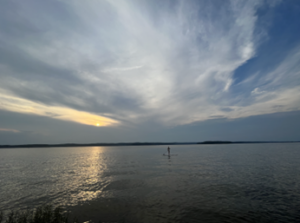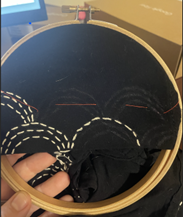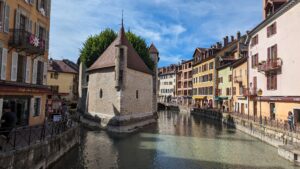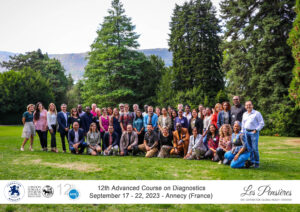By Gunjan Dhawan
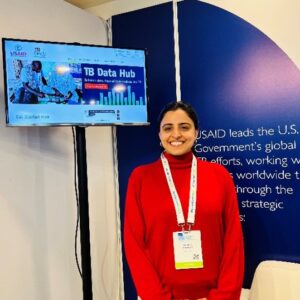
The fight against Tuberculosis
Tuberculosis (TB) is an infectious disease that continues to adversely affect lives globally. A major cause of ill health, it continues to be the second leading cause of death worldwide after coronavirus (COVID-19)[1]. Despite TB being a preventable and curable disease, over 10 million people contract TB every year1. Thirty high-burden countries account for 87% of the total TB cases, and a total of 1.3 million people died of TB in 2022 alone[2]. Continuous global efforts to fight TB have saved an estimated 75 million lives since the year 20002. Sustained funding to support research and innovative solutions are required to accelerate the fight against TB.
The TB Data, Impact Assessment and Communications Hub (TB DIAH) project, funded by the US Agency for International Development (USAID), is a cornerstone of the Agency’s Accelerator initiative to enhance existing TB data and knowledge sharing and to strengthen national TB programs worldwide[3]. The project supports governments, policy makers, and program stakeholders with the generation, analysis, communication, and use of accurate, quality data for decision-making and scale up. Furthermore, TB DIAH provides the technical know-how to ensure optimal demand for and analysis of TB data, appropriate use of that information to measure performance and to inform national TB programs (NTPs)[4]. From the Performance-based M&E Framework (PBMEF), to assessments, to data dashboards and other resources, TB DIAH offers a range of data-based tools and frameworks to help improve tuberculosis programs worldwide4.
Global with Gillings
For over 100 years, the Union World Conference has brought together different stakeholders working to combat TB across the globe. These include the different ministries of health, and government agencies, researchers and academicians, funders, implementing partners and private sector. The forum provides a great opportunity for all stakeholders to showcase results outcomes, initiatives of evidence-based research and practice for prevention, treatment, cure, innovation and beyond in the fight against TB. After two years of virtual conferences sessions due to COVID, the four day-long Union World Conference on Lung Health, 2023 was held in-person between 15th – 18th November in Paris, France. With funders, implementers, policymakers, patient advocates, decision makers, bilateral agencies, and other industry stakeholders all under one roof, TB DIAH made a strong presence by highlighting the incredible work done to build and strengthen TB data use in national TB programs across different geographies from the 24 USAID TB priority countries.
Along with the TB DIAH team, I had the good fortune to attend and participate in this year’s Union World Conference on Lung Diseases. I have been supporting the project with the conceptualisation, design, and technical content development for a TB M&E eLearning course to build the capacity of professionals working in national TB programs (NTPs) on M&E of different programmatic and clinical TB indicators. The course will support understanding of TB M&E and surveillance systems and explore how USAID’s PBMEF, which provides standardized, high-quality indicators, can improve the generation of quality data, and support the analysis, interpretation, and use of that data to inform programming, identify gaps, and strengthen the overall system. With dedicated time allocated for the information session at the booth, conference participants stopped for an engaging discussion on upcoming eLearning courses, and PBMEF, with the team. During the conference days, I supported these information and knowledge sharing sessions at the USAID booth, where the project team highlighted TB DIAH’s work on the (PBMEF) and TB M&E eLearning modules.
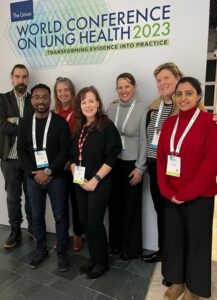
Experiential Learning
After months of focusing on critical public health issues affecting the world, learning about cultural humility, and practicing research methods and measures, participating at a world conference which focused on tuberculosis, was truly an experiential learning opportunity. It was a firsthand experience of witnessing evidence-based interventions that were implemented in different health settings across the globe being showcased at a forum where funders and implementers, researchers, physicians, and decision makers were all under one roof. Partners, innovators, and implementers shared best practices and innovative solutions that showed tremendous impact in increasing access to TB services across TB high burden countries. Sharing space to showcase the ongoing work on the TB M&E eLearning module, engaging in knowledge sharing sessions, and getting feedback from fellow participants on our work, was exciting.
It gave a diverse exposure to the progress towards TB elimination in the world, discover breakthrough AI based solutions to improve TB detection and simultaneously cross learn from other public health researchers and practitioners. Furthermore, I took back the experience of sharing a common space and goal with the TB DIAH team and partners, former colleagues, new associations, and stalwarts in the field of Tuberculosis – all wrapped up in the backdrop of the City of Lights: Paris.
I am grateful to my supervisor Ms Ann Marie Fitzgerald for her constant encouragement and support. A big shout out to an amazing team-Rebecca Cornell Oser, Meredith Silver, Bridgit Adamou, Margie Joyce, David La’vel Johnson, and Darrell R Keyes without whom this experience would have been incomplete.
I am both grateful and excited as I continue my journey in Global Health!

[1] Global tuberculosis report 2023. www.who.int. https://www.who.int/publications/i/item/9789240083851
[2] 10 facts on tuberculosis. www.who.int. Published October 26, 2022. https://www.who.int/news-room/facts-in-pictures/detail/tuberculosis#:~:text=About%20one%20quarter%20of%20the
[3] TB DIAH – Capture data. Contextualize data. Strengthen TB programs worldwide. Accessed December 13, 2023. https://www.tbdiah.org/
[4] Project Overview and Objectives – TB DIAH. Accessed December 13, 2023. https://www.tbdiah.org/about/tb-diah-overview-and-objectives/

